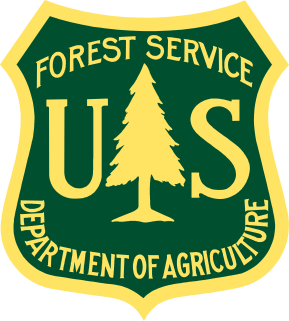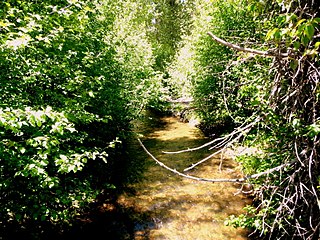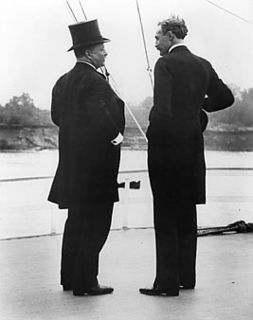The National Association of State Foresters (NASF) is a non-profit organization that represents the directors of the 50 state forestry agencies, eight United States territories, and the District of Columbia. State foresters manage and protect state and private forests across the United States, which together encompass two-thirds of the nation's forests.
Through public-private partnerships, NASF seeks to discuss, develop, sponsor and promote programs and activities which will advance the practice of sustainable forestry, the conservation and protection of forest lands and associated resources and the establishment and protection of forests in the urban environment. NASF was established in 1920.
The Cooperative Forest Fire Prevention (CFFP) Program, commonly known as the Smokey Bear program, was created to maintain public awareness of the need to prevent human caused wildfires. It is managed by the United States Forest Service in cooperation with the Ad Council and NASF.

The United States Forest Service (USFS) is an agency of the U.S. Department of Agriculture that administers the nation's 154 national forests and 20 national grasslands. The Forest Service manages 193 million acres (780,000 km2) of land. Major divisions of the agency include the Chief's Office, National Forest System, State and Private Forestry, Business Operations, and Research and Development. The agency manages about 25% of federal lands and is the only major national land management agency not part of the U.S. Department of the Interior, which manages the National Park Service, the U.S. Fish and Wildlife Service, and the Bureau of Land Management.

Forestry is the science and craft of creating, managing, planting, using, conserving and repairing forests, woodlands, and associated resources for human and environmental benefits. Forestry is practiced in plantations and natural stands. The science of forestry has elements that belong to the biological, physical, social, political and managerial sciences. Forest management play essential role of creation and modification of habitats and affect ecosystem services provisioning.
A tree farm is a forest managed for timber production. The term, tree farm, also is used to refer to tree plantations, tree nurseries, and Christmas tree farms.

Arboriculture is the cultivation, management, and study of individual trees, shrubs, vines, and other perennial woody plants. The science of arboriculture studies how these plants grow and respond to cultural practices and to their environment. The practice of arboriculture includes cultural techniques such as selection, planting, training, fertilization, pest and pathogen control, pruning, shaping, and removal.

A forester is a person who practices forestry, the science, art, and profession of managing forests. Foresters engage in a broad range of activities including ecological restoration and management of protected areas. Foresters manage forests to provide a variety of objectives including direct extraction of raw material, outdoor recreation, conservation, hunting and aesthetics. Emerging management practices include managing forestlands for biodiversity, carbon sequestration and air quality.

Urban forestry is the care and management of single trees and tree populations in urban settings for the purpose of improving the urban environment. Urban forestry involves both planning and management, including the programming of care and maintenance operations of the urban forest. Urban forestry advocates the role of trees as a critical part of the urban infrastructure. Urban foresters plant and maintain trees, support appropriate tree and forest preservation, conduct research and promote the many benefits trees provide. Urban forestry is practiced by municipal and commercial arborists, municipal and utility foresters, environmental policymakers, city planners, consultants, educators, researchers and community activists.

Certified wood and paper products come from responsibly managed forests – as defined by a particular standard. With third-party forest certification, an independent organization develops standards of good forest management, and independent auditors issue certificates to forest operations that comply with those standards.

Forestry laws govern activities in designated forest lands, most commonly with respect to forest management and timber harvesting. Forestry laws generally adopt management policies for public forest resources, such as multiple use and sustained yield. Forest management is split between private and public management, with public forests being sovereign property of the State. Forestry laws are now considered an international affair.
American Forests is a 501(c)(3) non-profit conservation organization, established in 1875, and dedicated to protecting and restoring healthy forest ecosystems. The current headquarters are in Washington, D.C.

Yale School of the Environment (YSE) is a professional school of Yale University. It was founded to train foresters, and now trains environmental leaders through four 2-year degree programs and two 10-month mid-career programs. YSE strives to create new knowledge that will sustain and restore the health of the biosphere and emphasizes the possibility of creating a regenerative coexistence between humans and non-human life and the rest of the natural world. Still offering forestry instruction, the school has the oldest graduate forestry program in the United States.

In the state of New Jersey, the New Jersey Division of Parks and Forestry is an administrative division of the New Jersey Department of Environmental Protection. In its most visible role, the Division is directly responsible for the management and operation of New Jersey's public park system which includes 42 state parks, 11 state forests, 3 recreation areas, and more than 50 historic sites and districts. However, its duties also include protecting state and private lands from wildfire, managing forests, educating the public about environmental stewardship and natural resources, as well as growing trees to maintain and restore forests in rural and urban areas, and to preserve the diversity of the trees within the forests.

Nolde Forest Environmental Educational Center is a 665-acre (269 ha) Pennsylvania state park in Cumru Township, Berks County, Pennsylvania, in the United States. Programs are offered for youth and adult groups, school groups, and individuals. The center grounds provide opportunities for hiking, birdwatching, and nature photography. The park is open from sunrise until sunset. Nolde Forest Environmental Education Center is on Pennsylvania Route 625 just south of Reading.

The Oregon Department of Forestry (ODF) is the agency of the government of the U.S. state of Oregon which performs a wide variety of functions relating to the management, regulation and protection of both public and private forest lands in the state. It was established in 1911 with the creation of the State Board of Forestry, its governing board, and the office of State Forester, appointed by that Board. It has the broad mandate of the State Forester's charge to "act on all matters pertaining to forestry." Specific activities of the department include forest fire prevention and protection; regulation of forest practices and promotion of forest stewardship; implementation of the Oregon Plan for Salmon and Watersheds; forest pest and disease detection and control; management of state-owned forestlands; nursery operation; forestry assistance to private woodland owners; forest resource research and planning; and community and urban forestry assistance.

Sun Pass State Forest is one of six state forests managed by the Oregon Department of Forestry. The forest is located 40 miles (64 km) north of Klamath Falls, Oregon near the southeastern corner of Crater Lake National Park. It is the largest single block of Oregon state forestry land east of the Cascade Mountains. The forest is managed as part of the Klamath-Lake District, comprising 21,317 acres (86.27 km2) of the 33,739 state-owned acres within the district.

The Oregon Board of Forestry is responsible for forest policy and oversight of forest management practices within the state of Oregon. The board appoints the state forester and oversees the Oregon Department of Forestry. The board also works with private land owners and the Federal Government to promote consistent forest management policies throughout the state.
The Virginia Department of Forestry (VDOF) was established in 1914 to prevent and suppress forest fires and reforest bare lands. Since its inception, the agency has grown and evolved to encompass other protection and management duties:

Starting in 1876, and undergoing a series of name changes, the U.S. Forest Service grew to protect and utilize millions of acres of forest on public land. Gifford Pinchot, an early advocate of scientific forestry, along with President Theodore Roosevelt and conservation organizations, led the effort to manage forest for the public good.
The North Carolina Forest Service, formerly known as the North Carolina Division of Forest Resources is a North Carolina state government agency responsible for providing land management assistance to landowners. The agency's primary responsibility is wildland fire control on all state and privately owned land in North Carolina, United States. The Service was a Division of the N.C. Department of Environment and Natural Resources until July 2011 and is now part of the North Carolina Department of Agriculture and Consumer Services.
The Alabama Forestry Commission (AFC) is the forest management agency for the U.S. state of Alabama. It was created as a state agency by an act of the Alabama Legislature in 1924. Its general mission is protecting Alabama's forests from wildfire, insects, and diseases; assisting landowners practice responsible forest management on their private property; and educating the general public about the value of Alabama's forests. It established the Alabama Champion Tree Program in 1970 and continues to maintain it.